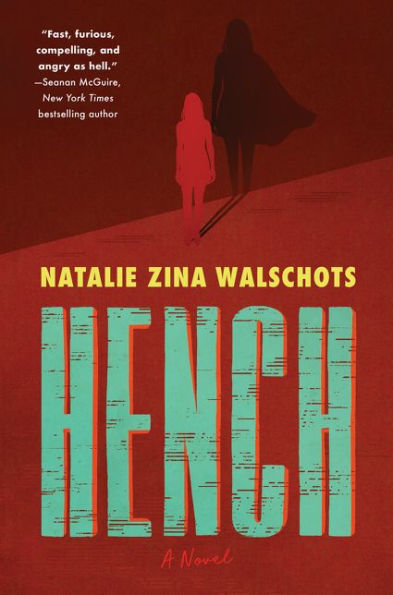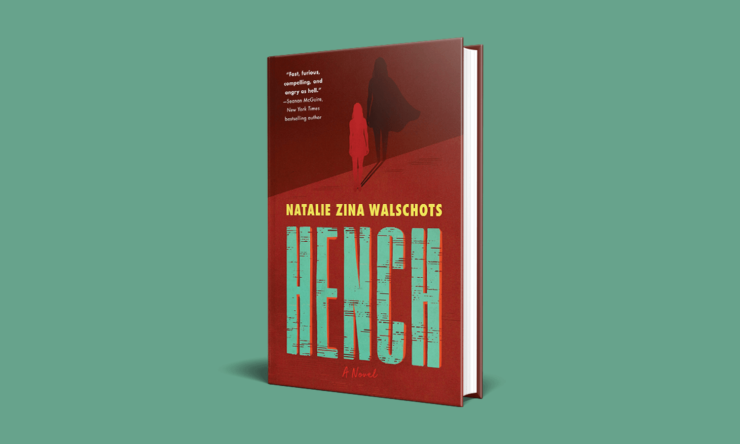I had a review copy of Hench, Natalie Zina Walschots’ 2020 novel about supervillains and their employees, on my shelf for months and months before I cracked it open. I have an aversion to superhero stories at the best of times, and as we all know, the last year has not been the best of times.
I should have read it sooner. Because goddamn, it’s good. Everything Amal El-Mohtar had to say about it is true. And it reminds me of Micaiah Johnston’s The Space Between Worlds, because one of Hench’s central organising concerns is disposability: the exploitation of insecure labour, and the carelessness and indifference of the powerful to the consequences of their actions, to the destruction of the lives of people whose only crime was to be in the way. It’s a book that strikes a little too close to home, because many of us who came of age in the last fifteen years are painfully aware of our contingency, our replaceability, when it comes to our employment.
Anna Tromedlov is an office temp. Her temp agency supplies staff for supervillains, and she mostly does data entry. Ethically, is it really any worse than working for an oil company? She has bills to pay and no support network that isn’t in the same cash-strapped boat.
On one assignment—a promising contract that might turn into full-time work—things go horribly wrong. An encounter with a “superhero” leaves her badly injured, and several of her fellow temp workers dead. She’ll have the scars—and when she can walk again, a cane—for the rest of her life. And of course, since her recovery means she won’t be able to work for months, she gets fired.
Buy the Book


Hench
But Anna’s not the only one who’s life has been ruined—or ended—by a superhero who valued stopping a supervillain’s mildly nefarious plan over minimising the damage to people who got in the way. With no money and no mobility, living on a friend’s couch, she starts to follow the data, and discovers that superheroes are as destructive as natural disasters—and far more self-righteous.
Her research leads to a job offer from the world’s most feared supervillain. Soon, Anna is heading up a department whose purpose is to show the world what superheroes really are, in all their destructive self-righteous humanity—petty and brutal as they are. Anna and her team can manipulate superheroes into revealing themselves as no better than anyone else, and even, in fact, worse, because the superheroes believe they have a right to act as they do. Justice or vengeance, Anna’s going to make them hurt—a goal that brings her into direct conflict with the most powerful, and least moral, superheroes in the world.
I don’t see life-altering injuries treated seriously very often in fiction. Anna’s injury affects her life and her self-image—and it makes her already precarious finances even more precarious—but it’s not the whole of her life, either, and the delight she takes in improvements (cosmetic or functional) to her assistive technology is very relatable. (I’m not really qualified to talk about the portrayal of longterm physical disability—all of my sports injuries have eventually resolved—but this feels more grounded than many.)
Hench moves between devastating and witty with a fluid elegance. It’s as serious as it is sharply humorous, which is to say: shockingly. Painfully. It’s a novel with an excellent voice and compelling characters, and it’s deeply invested in women. It cares about them, the solidarity between them: women’s friendships and women’s successes and women’s connections. (And also women’s biceps, to judge from the main character’s ogling: there’s a nicely queer sensibility there.)
Hench is a good book. It may even be a great one. It’s definitely entertaining as hell. I look forward to seeing more novels from Walschots’ pen—maybe even, if we’re lucky, a sequel.
What are you guys reading lately?
Liz Bourke is a cranky queer person who reads books. She holds a Ph.D in Classics from Trinity College, Dublin. Her first book, Sleeping With Monsters, a collection of reviews and criticism, was published in 2017 by Aqueduct Press. It was a finalist for the 2018 Locus Awards and was nominated for a 2018 Hugo Award in Best Related Work. She was a finalist for the inaugural 2020 Ignyte Critic Award, and has also been a finalist for the BSFA nonfiction award. Find her on Twitter. She supports the work of the Irish Refugee Council, the Transgender Equality Network Ireland, and the Abortion Rights Campaign.










